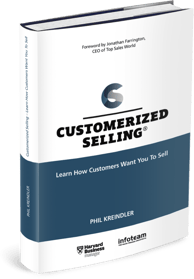 I recently asked for feedback from the US Major Accounts Manager of a large financial services company we have been working with this year.
I recently asked for feedback from the US Major Accounts Manager of a large financial services company we have been working with this year.
-
My team has employed the principles of "Customerized Selling" and it's not only helping our productivity and sales numbers (146% year-on-year growth), but helping us to form stronger relationships with our clients.
-
Our win rate has gone up by 38%.
When I asked what he would recommend other sales leaders to do to maximise their return on investment in our trainings, he said
-
Have the most senior leader write their own personal playbook and then use it to coach their own teams.
The other responses were very good to hear, but why was this the one I found most interesting?
Writing is learning
Lets just take a step back. When participants in a sales training start writing notes this is when real learning begins. Scientific research shows that the very act of writing helps to stimulate the brain and helps people think more effectively. Other research shows that when people write down their goals and share them with others they are significantly more likely (33%) to achieve those goals. That’s why we like to see people writing things down.
Writing your own playbook
If you write something you own it. You are more attached to it and more committed to it, as the research I mentioned above shows.
So what does this mean in practical terms for the effective design and full adoption of a new sales process that will deliver the sort of results I shared with you above?
I find that the best results come when I ask the sales leaders to write their own playbook based on the selling principles and coaching concepts being trained. This happens in the workshop so we can discuss the details and they don’t cherry pick and miss out vital content. By the end of the workshop they each have a document that they believe in and will implement with their team.
An additional benefit is that the sales leaders are setting an example in creating their own playbooks - one that their team can follow by creating their own playbooks with all the benefits I have described above. The personal playbooks become useful benchmarks and a great way to judge continuing improvement.
What does a playbook look like?
It depends on you and your business of course. The Major Accounts Manager at our financial services client wrote 4 pages of notes that were focused on coaching his team. Here is an extract from the section about the Buying Center:
-
Start by asking who the Endorser is. Then move to the Decider. Then move to the Assessors (they can say no, but don’t have the ability to say yes). Then Coach. Then Users.
-
Ask who else is involved in the transaction lifecycle (Customer-facing, finance, IT, operations, franchise, accounting, marketing etc.) for this project?
-
Ask about all Transaction Touch Points to identify the relevant customer stakeholders.
-
Ask whether our Coach has validated our perception of the Buying Center.
-
Put our value proposition in a format that makes it easy for a Coach to use internally.
-
Help our Coach to shine.
For this client the Buying Center is more complex than is typical and sometimes includes the customer’s customers. This may be very different for you - that’s why you need to create your own personal playbook. The key thing is that you write it, in your own words, for your own team.
Ask yourself
-
Are your sales leaders fully engaged with the process?
-
Do they set a good example to their team?
-
Have they made the process their own?
 Customerized Selling: Learn How Customers Want You To Sell
Customerized Selling: Learn How Customers Want You To Sell
Learn how customers want you to sell. In Phil Kreindler’s book, Customerized Selling, he incorporates how customers define good selling into all aspects of sales force development.
